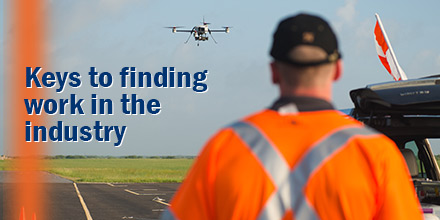Keys to Finding Work in the Drone Industry
 The past decade witnessed the explosion of drone technology and the widespread adoption of this technology for numerous applications.
The past decade witnessed the explosion of drone technology and the widespread adoption of this technology for numerous applications.
The use of UAVs is varied — from construction and agriculture to videography and real estate — and applications continue to expand.
This burgeoning industry has left many wondering if a passion for flight could evolve into an exciting career.
However, the path to becoming a professional drone pilot takes diligence and planning. So, for an experienced drone pilot, how easy is it to set up business and watch the money roll in?
Proper certification
A Remote Pilot Certificate is vital. FAA approval is required if a drone is used for any business purposes. Operating without such certification can result in hefty fines.
A Remote Pilot Certificate, or “drone license”, allows a pilot to legally fly a drone for profit making purposes. The certification process differs between first-time pilots and those who are existing pilots.
First-time pilots must:
- Be at least 16 years old
- Read, speak, write, and understand English (*exceptions made for certain impairments)
- Be in a physical and mental condition to safely operate a small UAS
- Pass the initial aeronautical knowledge exam at an FAA-approved knowledge testing center
For a full list of requirements, visit the FAA website.
Existing pilots:
- Must hold a pilot certificate issued under 14 CFR part 61
- Must have completed a flight review within the previous 24 months
For a full list of requirements, visit the FAA website.
Of course, there are certain restrictions pilots must follow when operating a drone…even if it is for business purposes. Particular operation also require a 107 waiver – which can take weeks to clear.
Holding the proper certification and understanding the rules governing flight operations are vital.
To Niche or Not to Niche?
As drone technology evolves, more and more niche applications arise. As such, a great starting point is to identify the niches that best suit a pilot’s interest and skill set.
Developing the knowledge and specialized skills needed for a particular sector — aerial cinematography, 3D mapping, precision agriculture — is one approach.
And though all involve the use of a drone, payload selection (camera, lens, etc.), information capture and post-processing software are unique to the application. Plus, selecting the right vehicle is vital — not all drones are capable of supporting each mission.
Specialization allows a pilot to gain the knowledge, experience — and optimal equipment — to operate as safely and efficiently as possible. All while producing exceptional results for the client.
Of course, specialization has drawbacks but it is one way a drone pilot can separate themselves from an increasingly populated market.
Outsourced work, another option
The number of industries using drones, of course, continues to grow. Some choose to keep all operations in-house while others are outsourcing all flight operations.
Outsourced pilot positions put a premium on pilot competency and tend to require higher levels of professional experience, certification and training.
Those interested in securing such work should place greater emphasis on gaining knowledge, expertise and the proper certifications. a professional reputation in order to be successful.
As UAV applications increase and drone technology improves, the number of opportunities within the market will continue to expand.
Of course, piloting UAVs as a career is an enticing prospect for many amateur drone pilots and enthusiasts. Ultimately, the quality of a pilot’s work is what will differentiate a professional from an amateur.
By Pamela

